The bad news: the tech industry isn’t very inclusive. The good news: Every individual has the power to help change that.
In Built In’s State of DEI in Tech report, the results were clear when it came to inclusion: Just 54 percent of tech employees say they feel a sense of belonging at work, but that number drops to 43 percent for BIPOC individuals and 40 percent among Black employees.
While a growing number of tech employers are investing in dedicated leadership and other initiatives to address diversity and equity issues, this effort goes far beyond policies. Inclusion indicates a sense of belonging, and it’s built into the culture by individual contributions. Beyond the domain of management, individuals have immense power to foster a sense of solidarity among peers.
So, how can we all do better?
We asked Chicago DEI advocates and experts to share simple actions any employee can take to make a difference. Eboni Brown-Moore, senior team lead and employee resource group (ERG) co-lead at SpotHero, encourages individuals to seize every opportunity to be an active participant in DEI change whether it's completing a company survey, starting a peer support group or becoming an ally in an ERG.
“The consistent presence of allies during ERG ally meetings lets me know we are doing something right as an organization seeking to improve inclusivity,” said Brown-Moore. “Even if that ally does not say anything but ‘hello’ at the start of the meeting, they chose to prioritize support for an underrepresented group within the organization. That is the type of commitment, vulnerability and connectedness I wish we could all see more of.”
Here are 13 simple actions you can take today to create your own DEI plan.
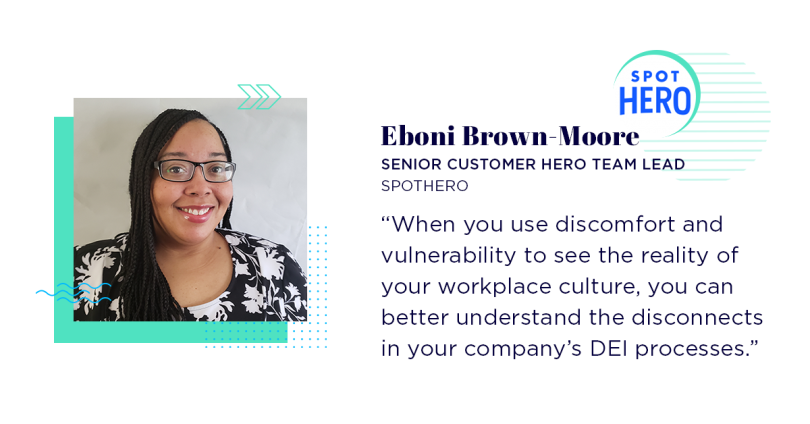
Be vulnerable and have uncomfortable conversations
“Individuals often underestimate the power of vulnerability and transparency for fear of judgment in the workplace. I have experienced firsthand that when you use that discomfort and vulnerability to see the reality of your workplace culture, you can better understand the disconnects in your company’s DEI processes.
Individuals may share the desire to work for a highly diverse, equitable and inclusive employer but don’t know how to start the conversation without fear of judgment or consequences. Take a moment to have a conversation with your manager, peers or decision-makers about the change you want to see. That's the first step. Speaking your truth and advocating for positive change is invaluable for yourself and those who will come after you.”
Eboni Brown-Moore is a senior team lead and ERG co-lead at SpotHero, a tech company focused on transportation and parking.
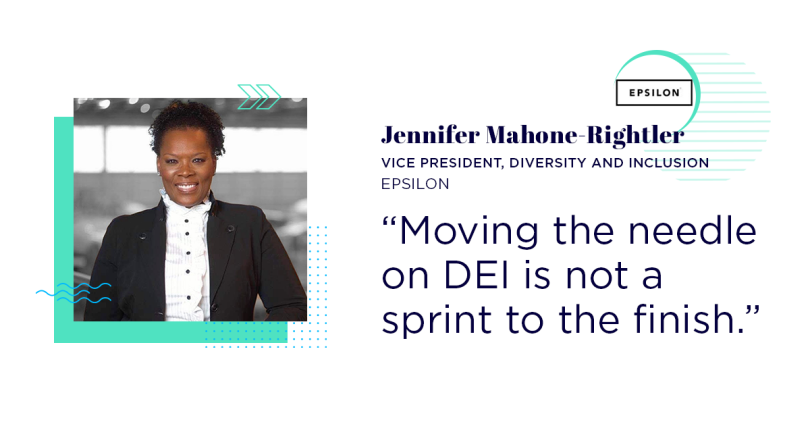
Ensure everyone is recognized in everyday interactions
“A diverse organization will only thrive when it’s an inclusive organization. All employees play a role in creating a collaborative environment where everyone is accepted and heard. For example, in a remote environment, this could mean making sure everyone in your meeting is introduced and has the opportunity to ask questions and share opinions. You can also participate in training to interact with others who have different perspectives or find meaningful ways to recognize your colleagues’ accomplishments.
Moving the needle on DEI is not a sprint to the finish. One of the most impactful ways you can be the change you want to see in your organization is to set a high standard by being inclusive, collaborative and respectful through your everyday actions.”
Jennifer Mahone-Rightler is vice president of diversity and inclusion at Epsilon, an outcome-based marketing company.

Acknowledge your own biases
“The first step is to commit to learning about your biases — conscious or unconscious — and how to interrupt them. Learn how you are impacting the cultivation of an inclusive workplace.
Regularly learning new things about someone who has a different lived experience than yourself is something that anyone can do. When you do this, you can learn to be more empathetic towards a wider variety of people. Based on what you learn, you can determine what choices you can make to contribute to a more inclusive culture. It is in making inclusive choices that independent contributors can have an impact on an organization’s culture.”
Pamay Bassey is the chief learning and diversity officer at The Kraft Heinz Company, a food and beverage firm on a mission to create AI-powered solutions.
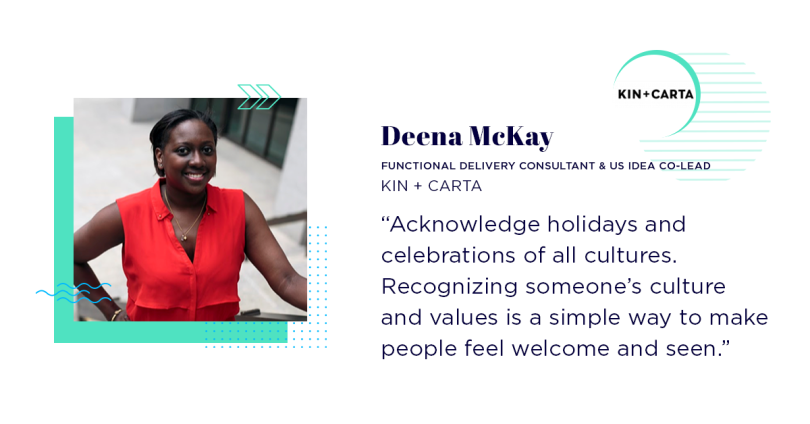
Celebrate cultures that are different from your own
“Acknowledge holidays and celebrations of all cultures. Recognizing someone’s culture and values is a simple way to make people feel welcome and seen. In action, this looks like asking your team members how they are going to celebrate holidays at the end of a team call or meeting. Communication platforms such as Slack are a great resource to help employees become more aware of cultural and religious celebrations. These platforms can be used to educate those in your team or across your organization.
Be mindful of scheduling meetings or being more flexible for teammates celebrating or taking part in holiday and religious rituals. For example, during Ramadan, plan something that doesn’t include food when you have a team member who fasts all day.”
Deena McKay is a functional delivery consultant and US inclusion, diversity, equity and awareness co-lead at Kin + Carta, a digital transformation firm.
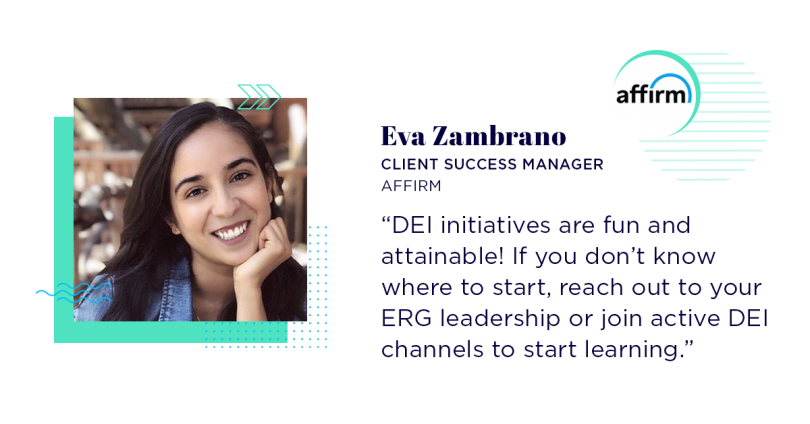
Pay attention to recognition patterns
“We recently found that Amigxs members wanted to feel more celebrated. I took on the role of our ERG social chair to ensure member achievements are spotlighted at meetings. This is something anyone can do! If you notice only specific types of people are being celebrated or promoted, step up to lead recognition emails or posts on a weekly cadence to ensure everyone has equal visibility and an opportunity to voice their wins. Small celebrations like this uplift team members and help create equal opportunities.”
Eva Zambrano is a client success manager at Affirm, a fintech company.
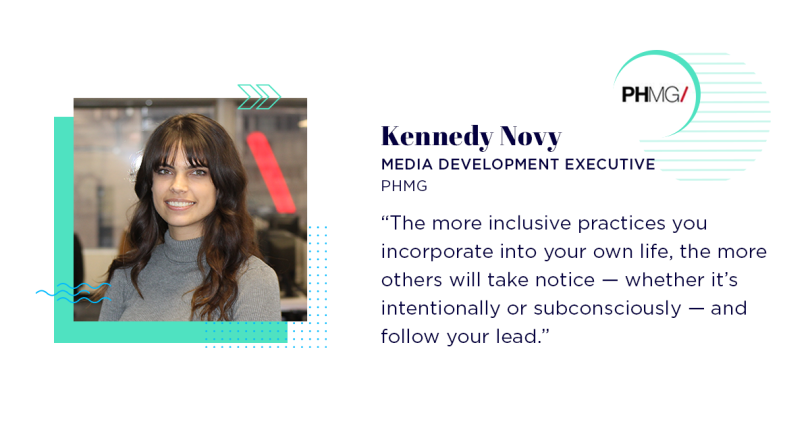
Think out loud about the language you use
“The more inclusive practices you incorporate into your own life, the more others will take notice — whether it’s intentionally or subconsciously — and follow your lead. An example would be using ‘they/them’ if you aren't sure of someone's pronouns, which is a small change that could make a big difference to the individual.
Something I've learned in the last year is that it's important to pay attention when I catch myself saying or thinking something that may be representative of unconscious or passive bias. This is something that you can only do for yourself, but if you start the conversation and recognize it out loud, it will eventually catch on with others around you.”
Kennedy Novy is a media development executive at PHMG, an audio branding agency.
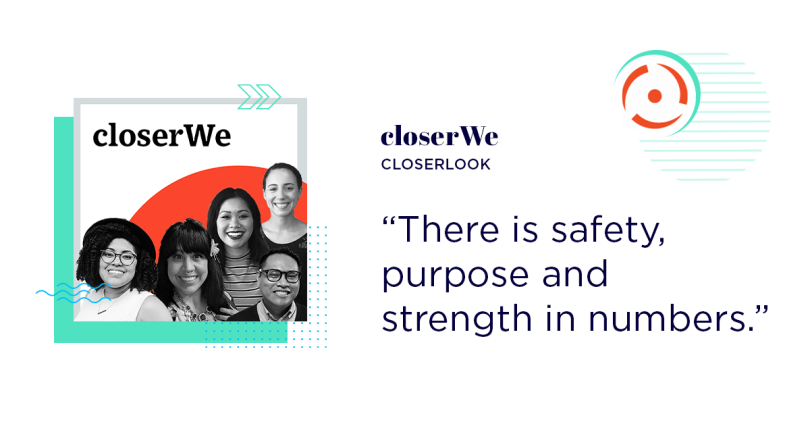
Get out of your bubble
“No one is an island. We recognize there is safety, purpose and strength in numbers. One concrete action to bring about meaningful and sustaining change is for individuals to partner with each other to transform diversity, equity and inclusion efforts within their organization.
Our commitment to collaboration generates better ideas than we would have in isolation. We strongly believe in every opportunity to partner with other ERGs for company-wide initiatives to amplify voices that are seldom heard. CloserWe works with the agency’s HR and executive leadership teams to provide counsel in the development of short- and long-term goals to attract and retain diverse talent.”
closerWe is the diversity, equity and inclusion ERG at closerlook, a digital marketing agency.
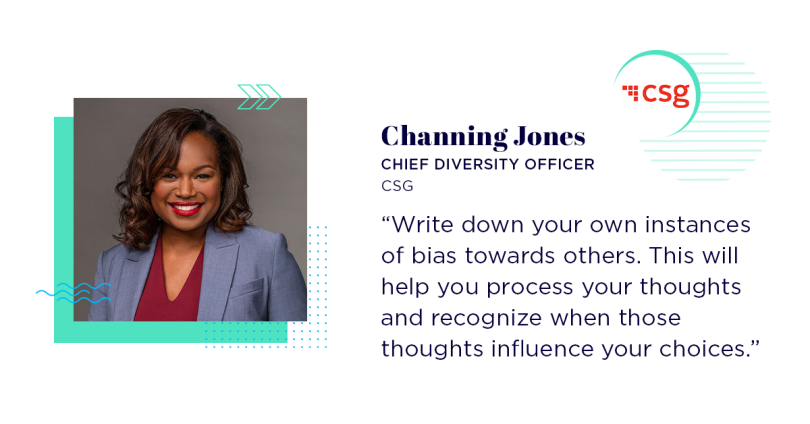
Write it down
“I recently read about keeping a bias journal at work. As a person that writes down everything and keeps a journal, I immediately gravitated toward this concept. You can use this journal to write down your own instances of bias towards others. This will help you process your thoughts and recognize when those thoughts influence your choices. We all have biases, but biases can become exclusionary practices, behaviors and policies. The more we record our thoughts, the easier it is to recognize the behavior and become more aware. This awareness and practice will lead to new behaviors. I suggest reading your journal at the end of each week and committing to actions that counter your biased behavior.”
Channing Jones is chief diversity officer at CSG, which helps companies acquire, monetize, engage and retain customers.
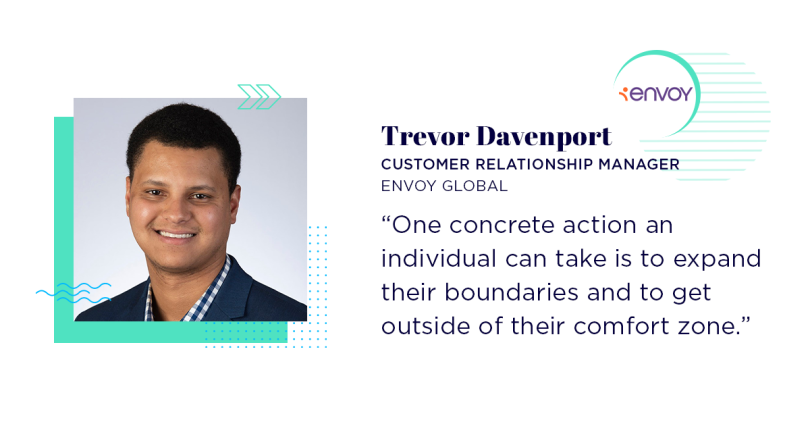
Expand your horizons
“One concrete action an individual can take is to expand their boundaries and to get outside of their comfort zone. This can be as small as having lunch with someone you've never worked with before, or volunteering with a different ethnic or socioeconomic group that you normally would not have the opportunity to interact with. Stepping outside of your comfort zone shows a willingness to learn about someone or something you don't quite understand. This helps encourage and promote diversity and inclusivity. In addition, it helps diminish unconscious bias and thoughts of division simply from a narrow way of thinking or unknowing perspective.”
Trevor Davenport is a mid-market customer relationship manager at Envoy Global, an immigration management platform.
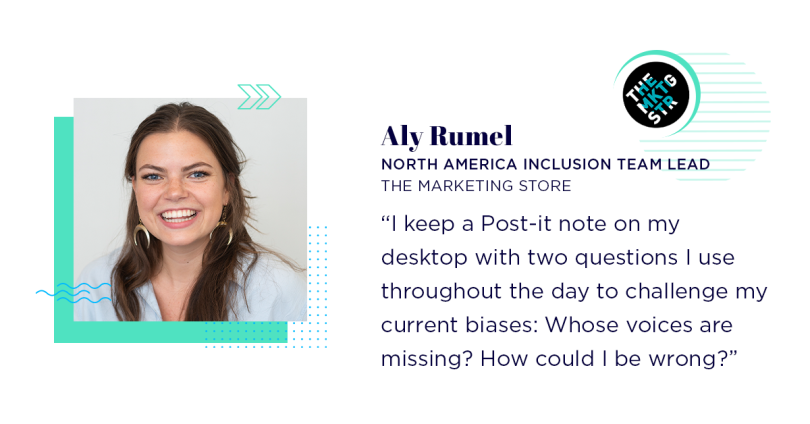
Turn good intentions into inclusive actions
“I keep a Post-it note on my desktop with two questions I use throughout the day to challenge my current biases: Whose voices are missing? How could I be wrong?
It only takes a minute to have this dialogue in my head, and it almost always results in an actionable step I can take to think beyond my own experiences. Often it’s as simple as copying a few extra folks when I send out meeting notes or finding a new way for coworkers to participate in a virtual meeting. Even these seemingly small steps help to expand the conversation in a way that empowers more people to show up authentically and contribute.”
Aly Rumel is a senior account executive and the North America inclusion team lead at The Marketing Store, a global customer engagement agency.
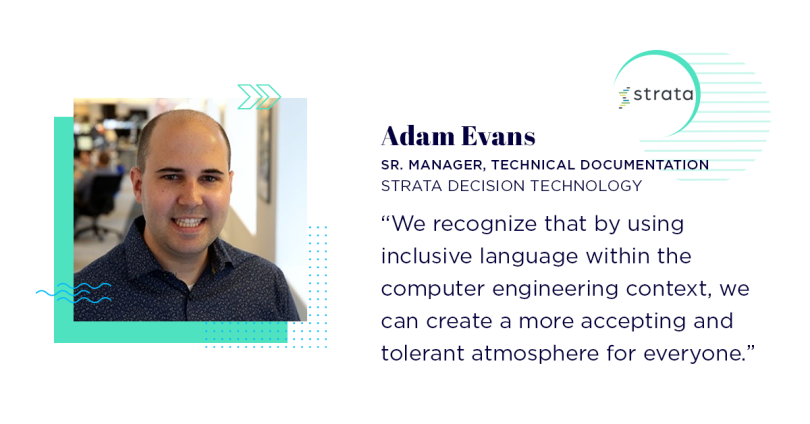
Go beyond policies and examine your product
“When it comes to diversity, equity and inclusion, team members often adhere to the policies and practices of their organization. We decided to broaden our lens to our product as well. As a healthcare IT company, we recognize that by using inclusive language within the computer engineering context, we can create a more accepting and tolerant atmosphere for everyone.
If you work in tech, you’re probably familiar with the debate over terms that invoke racist history, such as whitelist and blacklist. While many people will claim they never consciously associated such terms with racism, the reality is that words matter. These words perpetuate the notion of white as good and black as bad.”
Adam Evans is a senior manager of technical documentation at Strata Decision Technology, a platform for healthcare software and service solutions.
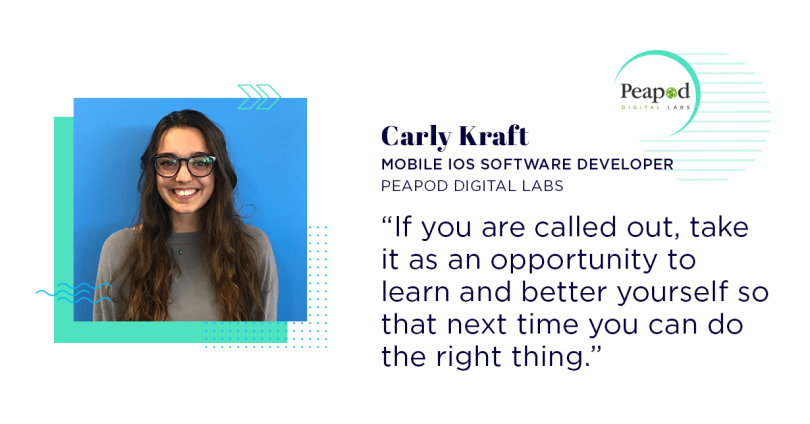
Own your shortcomings
“The action that holds the most meaningful change is to accept yourself as a constant learner. Everyone is going to say or do the wrong thing at some point in their life. If you are called out, take it as an opportunity to learn and better yourself so that next time you can do the right thing. Creating a space in which you are willing to learn will spread education and lift the voices of those who have been undermined for too long.”
Carly Kraft is a mobile iOS software developer at Ahold Delhaize USA, the e-commerce engine of grocery retail group Ahold Delhaize USA.
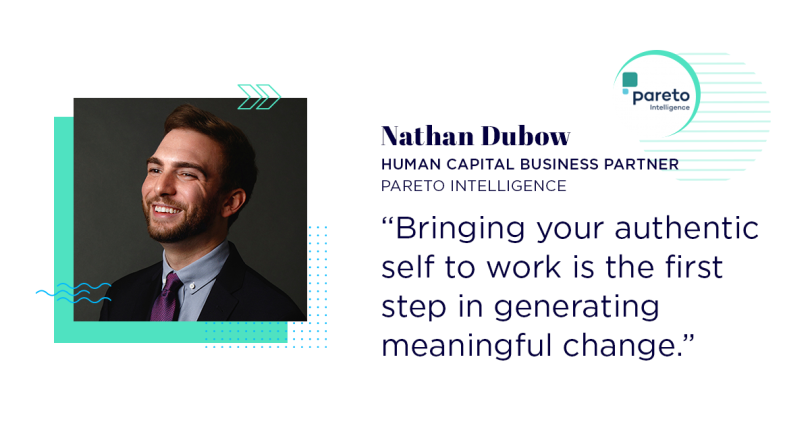
Be authentic in the workplace
“Bringing your authentic self to work is the first step in generating meaningful change. By embracing your own traditions and culture, you are creating a safe environment for your peers to share their personal experiences and stories. These interactions bring organizations together in ways that might not have been possible before. Through this process, you are perpetuating a workplace culture that celebrates individual differences and promotes intellectual curiosity.”
Nathan Dubow is a human capital business partner at Pareto Intelligence, a healthcare analytics and technology company.





